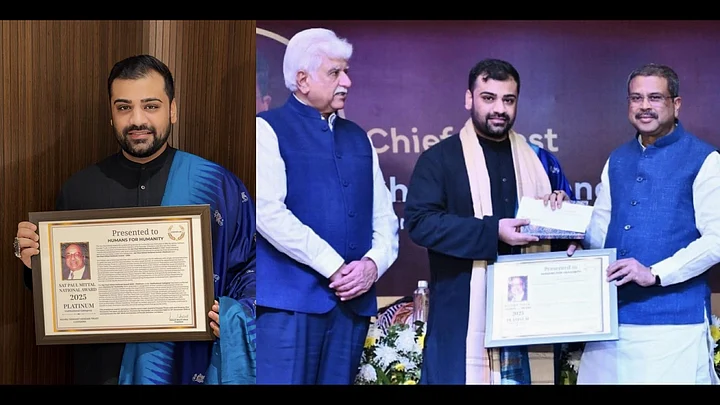In a ceremony marked by sincerity and a sense of collective purpose, social worker Anurag Chauhan, founder of Humans for Humanity, was conferred the prestigious Sat Paul Mittal National Award 2025 (Platinum Category – Institutional) for his organisation’s transformative work in menstrual hygiene and community empowerment. The award was presented by Union Education Minister Dharmendra Pradhan, in the presence of Rakesh Bharti Mittal, President of the Nehru Sidhant Kender Trust.
The Trust, which has been honouring changemakers since 1983, selected Humans for Humanity as a joint Platinum Awardee for its flagship WASH Project (Women Sanitation Hygiene), an initiative that has quietly and consistently altered the landscape of menstrual health across India. The honour carries a cash prize of Rs 3,75,000 and a citation.
The jury that selected the awardees included former Army Chief General Ved Prakash Malik, Dr Naresh Trehan, Chairman of Medanta - The Medicity, Rakesh Bharti Mittal, Vice Chairman of Bharti Enterprises, Bharat Singh Sobti, Senior Advocate General of Punjab, Onkar Pahwa, Chairman of Avon Cycles, and industrialist Bipin Gupta, reflecting a diverse and distinguished panel of national leaders.
For Chauhan, the moment marked not just personal recognition but a decade-long struggle to make menstruation a mainstream conversation.
An 11-year grassroot movement that grew into a National model
Launched in 2014 from Dehradun, the WASH Project has grown from a small door-to-door effort into one of India’s most influential menstrual hygiene movements, transforming the lives of over 4.8 million women and girls across seven states. For more than a decade, Humans for Humanity teams have travelled into slums, tribal belts, remote villages, schools, prisons, shelter homes and disaster-hit regions creating the first safe spaces for women and girls to speak openly about menstruation, understand their bodies, and access healthier, dignified choices.
What makes WASH a national model is the depth of its impact. The programme goes beyond menstrual education to address nutrition, mental health, menopause and gender inclusion, while community-run biodegradable pad units have given thousands of women both access and livelihood. Campaigns like the Red Cloth and “Breaking the Bloody Taboo” have overturned harmful generational practices, reduced infections, and normalised conversations in homes that once treated menstruation as shameful. Through consistent grassroots immersion, WASH has turned silence into awareness and beneficiaries into leaders proving that long-term change begins at the community level.
‘Menstrual health is a right, yet remains treated as an afterthought’
Speaking at the event, Chauhan said the award underscores a crisis that is still not fully understood.
“Menstrual health is a fundamental right, yet it remains one of our most neglected public issues. Millions still face stigma, misinformation, and a lack of basic access. This recognition strengthens our resolve to ensure that menstruation never becomes a barrier to dignity or opportunity.”Anurag Chauhan, founder of Humans for Humanity
Chauhan dedicated the award to his team and thousands of community volunteers across the country.
A journey that began at 14
Chauhan’s story has long stood out in India’s social sector. Beginning his activism at the age of 14, he quickly emerged as one of the most visible young voices in menstrual hygiene advocacy, earning nicknames like ‘Padman’ and ‘PadWarrior’ from various communities he served.
His work has previously earned national and international honours, including the United Nation’s Karmaveer Chakra Award, Bharat Nirman Award, International Women Empowerment Award, the International Women’s Day He For She Award, and the Mahatma Puraskar for social impact.
